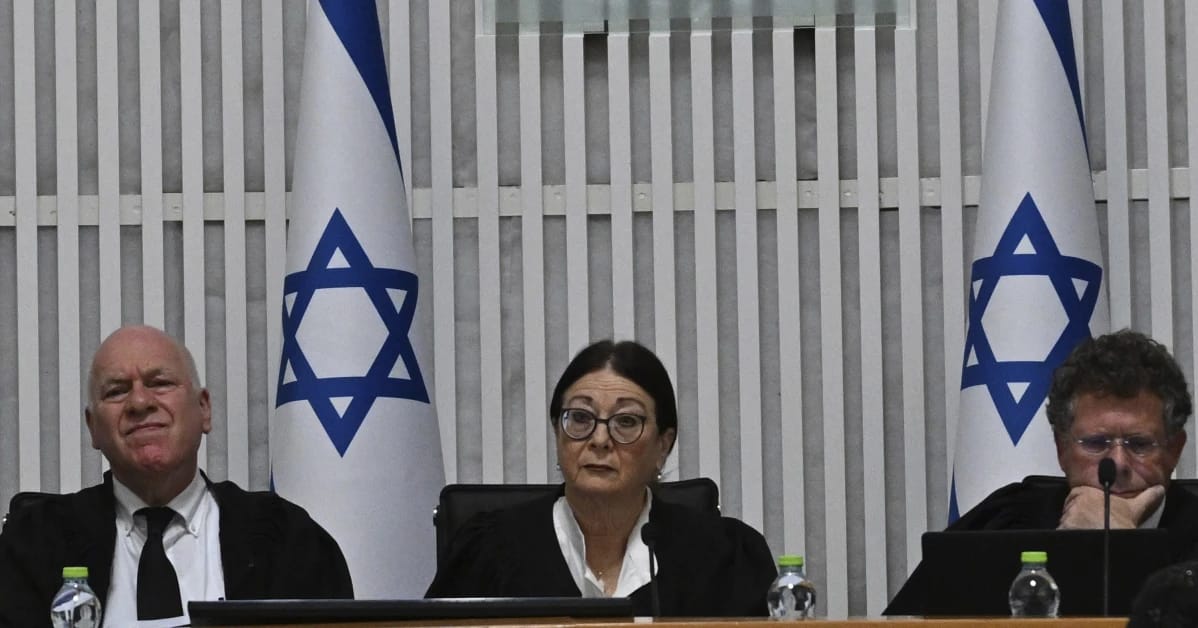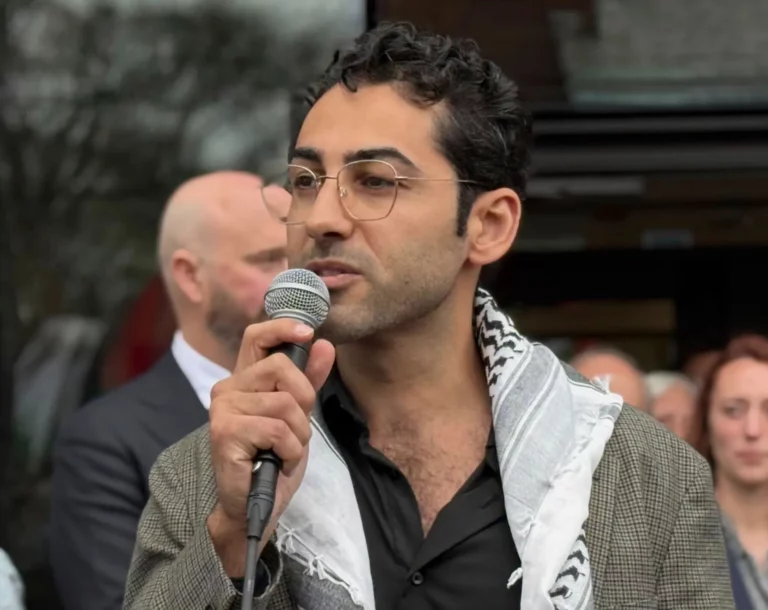In a landmark decision that has sparked widespread debate, the High Court of Justice of Israel has struck down a piece of legislation that limited judicial oversight of the government, marking the first time in Israel’s history that an element of its quasi-constitutional Basic Laws has been annulled.
The High Court’s decision was narrowly reached, with eight justices voting in favor of striking down the law and seven voting against.
The contentious legislation, which was the only significant law passed from the government’s judicial overhaul agenda, abolished the judicial use of the “reasonableness” standard.
The ruling sets a legal precedent, affirming the High Court’s contention that, under limited circumstances, it holds the right to annul Basic Laws. These laws form the foundation of authority for all state institutions, including the court itself. Twelve out of the fifteen justices concurred that the court possesses the authority to invalidate Basic Laws.
The reasonableness law, enacted in July as an amendment to Basic Law: The Judiciary, prohibited courts, including the High Court, from assessing and ruling against government and ministerial decisions based on the judicial standard of reasonableness. Petitioners against the law, including Attorney General Gali Baharav Miara, argued that it removed essential safeguards for Israeli democracy and warranted nullification. Conversely, the government maintained that this standard granted the court excessive power to interfere in policy decisions, which should fall under governmental jurisdiction, and contested the court’s authority to strike down Basic Laws.
Prior to the October 7 conflict with Hamas and Hezbollah, some government ministers and coalition members had indicated that they might not respect a decision to annul the legislation, raising concerns about a potential constitutional crisis. The ongoing conflict may influence the reactions to this decision.
During the September hearing on the law, liberal justices like Acting Supreme Court President Uzi Vogelman expressed grave concerns that the law effectively annulled all meaningful judicial review of government and ministerial decisions. However, conservative justices such as David Mintz and Noam Sohlberg argued that there was no constitutional basis for the High Court to invalidate Basic Laws.
(YWN World Headquarters – NYC)











20 Responses
Netanyahu should pack the court. Pass legislation expanding the number of supreme court judges by double, effective immediately, with him given the right to appoint all the new judges with immediate effect.
Well done. Either the law is for all or it is for none. What a lousy job by the Government. They had one chance to get it right.
Wow, they’re not נוגע בדבר, are they? What a crock.
Last gasps of the evil rule of the erev rav liberals before Mashiach
May the existence of the evil High Court be erased soon
The ruling boils down to dictatorship. A small group of unelected people have the right to invalidate any law just because they feel like it.
In middle of a war, they have nothing else to be concerned with.
How low do you have to be to use the cover of war to pass very unpopular legislation.
“May the existence of the evil High Court be erased soon..”
Just as soon as the lower courts indict the “evil” Netanyahu and his political hacks for their responsibility and culpability in the murder of 1200+ yidden on Simchas Torah and his continuing focus on political survival when waging the war in Gaza.
An unelected self-selecting secularist clique has given itself supreme and unchecked power, elections be damned. G-d fearing Jews have now been officially declared without rights. The only thing that comforts me now, is knowing that everything Hashem does, he does it for the best.
They should do to this “supreme court” just as they did to the “supreme court” in Gaza… destroy it! This is סדום court & rules!
Gadolhadorah:
What does one have to do with the other?
But I agree actually. I hope the Court’s clock is ticking, just as surely as Bibi’s is.
Kangaroo court. Joke.
This is why we can’t have nice things.
It is ridiculous in a number of ways. First of all, call things “basic” or “reasonable”, whatever, there IS no constitution in Israel. They are able to make things up as they go along.
Second, and the USA still has this lesson to learn, the Court has no army. It is the height of NON-DEMOCRACY for a court that is not selected by The People to make arbitrary decisions that are not subject to any review by The People or its representatives.
In the USA, there are plenty of examples where the Executive ignored the rantings of the Court; they’re simply unenforceable.
This will not go well.
Esther Hayut ימח שמה וזכרונה needs to be sent on a 1 way ticket to Gaza, to spend her entire retirement years dealing with Hamas, and doing something beneficial to Israel.
“What does one have to do with the other?”
Absolutely nothing, other than hope eternal and unchecked power in ANY branch of government is evil
@ujm: I think packing the court is the wrong way to go. It is a political response and only furthers the divide while creating political capital for those who oppose judicial reform. What I think makes more sense is to hold open and public impeachment hearings for the judges who voted to overturn a basic law in the middle of an existential war for Israel’s survival.
We should have them publicly explain to themselves a) what legal justification they had for such a decision and b) what was so pressing that they had to make that decision at a time when it threatened to divide us social and thereby threaten us physically.
If they can offer no good explanations, then they should be removed from the court. At that point, a better system for appointing justices should be implemented and we should do our best to find HONEST, NON-POLITICAL judges to replace them.
@aml: The reason why we need judicial reform is because we don’t have one law for everyone. We have a biased court that uses otherwise sound legal principles like reasonableness to impose their narrow, particular world view on the entire country.
We would all love one law for everyone. But when institutions that we rely on (like the courts) actively take on a biased, political role then we do not have one law for everyone and are forced to resort to measures like the reasonableness law to set things in balance.
Of course, it would be better if there was no need for such a reform. If the judges could judicially (and not politically) use that standard. But that’s not what they did – and the reasonableness clause is an effort to deal with their being out of control.
What we have now is a situation where millions of Israelis (myself included) don’t look at the court as a legitimate institution, but a dictatorial one. Nothing is more dangerous for a society than for its foundation institutions to have no legitimacy in the eyes of the population. At that point, there is a real danger of either
a) violence on the part of the population who sees them as illegitimate
or
b) violence on the part of the ruling institutions to maintain their power.
We don’t want either. And that is why we need a clause like the reasonableness clause – to force the court to act responsibly until such time as they can do so on their own (at which point, we can repeal that clause).
@Gadolhadorah: That is quite an accusation – and highly irresponsible. AFTER the war, there should be a thorough investigation — and each part in the knesset (except for the Arab parties) should be allow to appoint an investigator with full investigatory powers to get to the bottom of what happened.
Was it’s Bibi’s policies. If so, let’s hear the evidence and the reasoning behind that evidence.
Was it the philosophical world view of the higher ups in the army. Again, let’s hear the evidence and arguments.
Was it negligence? Once, again – make the case.
In short, we need as thorough, fair, broad and trustworthy an investigation as possible. Everyone from the left to the right should have a chance to make their case, publicly (and hopefully, honestly and without bias). THEN we can talk about who is responsible.
In terms of “focusing on political survival” – if one OBJECTIVELY looks at the war in Gaza, it is hard to say that this has been a political war. ALL SECTORS of Israeli society are involved one way or another – either in physically fighting or through various means of support.
Bibi has set up a war cabinet with Gantz and (I think wisely) NOT with Lieberman or Lapid. He has rebuffed quite a bit of international pressure, reassured the people, visited the soldiers and frontlines and so far been one of the leaders of a painful, but seemingly successful war (bezras Hashem we will be matzliach).
To at such times insert politics into the war is the EXACT OPPOSITE message that HaKadosh Baruch Hu is trying to send us. He wants us to start LOVING and CARING for each other. To LISTEN to each other. To try and UNDERSTAND each other. And to stop with all the accusations and machlokes.
As such, I call upon you in the name of those 1200+ karbonot to make your contribution to ACHDUS! And that starts with seeing how you can HELP, not whom you can blame.
@unommin: The principle of reasonableness is a well-established legal principle in numerous legal systems – including the Common Law which (I believe) Israeli law is partially based on. Here is how chatgpt defines it:
“The principle of reasonableness is a fundamental legal concept used across various jurisdictions and legal systems. It represents a standard of fairness, appropriateness, and rationality in the actions, decisions, and judgments of individuals, especially those in positions of authority like judges, officers, and public officials.”
The real problem is not necessarily the concept of reasonableness, but rather the coopting of that principle for one’s own political biases and desires. That’s the bigger issue – wrapping politics in the language of lofty principles that society holds by. One acts political, but presents oneself as honest and principled.
Secondly, the idea of judicial review is of fundamental importance. The court doesn’t have an army because it’s power doesn’t come from physical might, but from the wishes and desires of a society to be a law-abiding, fair society. They then trust various individuals with implementing those wishes and desires.
The problem comes when the people entrusted to fulfil our communal desire for honesty and fairness start acting egregiously unfairly and unjust. The solution is to find a way to get the judges to be more inline with the roles entrusted to them. Not to undermine and remove the institutions whose job it is to help us live by our higher ideals.
@147: Esther Hayut is a Jew. One who I fundamentally disagree with in many areas and who I think has done a lot of harm. But she is still a Jew with a Jewish neshama and like many Jews before her is capable of doing complete and full teshuva (and there have been many occasions where Jew’s like Esther Hayut have done such teshuva).
As noted by Bruria, the proper way to relate to her is to daven that she does teshuva. To seek what’s best for her while simultaneously seeking what is best for Am Yisrael.